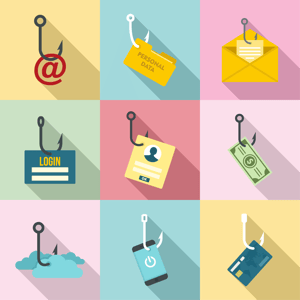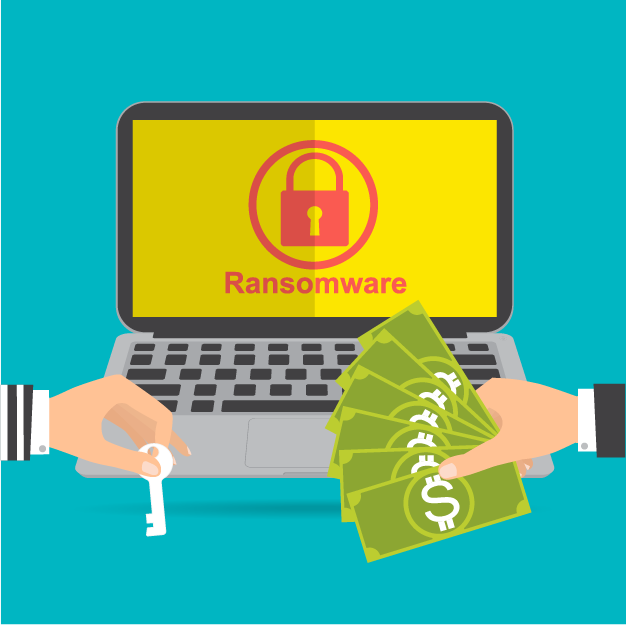The Dangers of Phishing, Malware, and Ransomware for Your Business
Introduction
 In the online world, businesses need to stay alert to protect themselves from cyber threats. Cyber attacks like phishing, malware, and ransomware can hurt a company's reputation, money, and trust with customers. In this blog post, we'll explore the dangers of phishing, malware, and ransomware for businesses. We'll also share examples of these threats and give you tips to help avoid becoming a victim of cyber attacks.
In the online world, businesses need to stay alert to protect themselves from cyber threats. Cyber attacks like phishing, malware, and ransomware can hurt a company's reputation, money, and trust with customers. In this blog post, we'll explore the dangers of phishing, malware, and ransomware for businesses. We'll also share examples of these threats and give you tips to help avoid becoming a victim of cyber attacks.
What is Phishing?
Phishing is a sneaky way cyber criminals trick people into giving away their private information or clicking on bad links. They usually do this by sending emails that look like they're from a trusted source, such as banks, government offices, or coworkers.
Example 1: Fake Invoice Email
Imagine getting an email that seems to be from a company you work with, containing an invoice for something you bought. The email has a link to pay the balance, but if you look closely, the sender's email address doesn't seem quite right. This is a common phishing attempt, where a cyber criminal is trying to get you to click on the link and give them your personal or financial information.
Example 2: Password Reset Scam
You might get a text message or email that looks like it's from your company's computer team, telling you to reset your password right away because of a security problem. The email looks real, but it's actually a phishing attempt. The link they give you goes to a fake website, where the bad guys can steal your login information when you try to reset your password.
Understanding Malware
Malware is malicious software that can sneak onto your computer or network and cause all sorts of problems. It can damage your files, steal your sensitive information, and even let cyber criminals control your computer. One way malware attacks can spread is through phishing emails.
Example: Malware from an Email Attachment
Your business gets an email with an attachment that looks like it's from a trusted partner. An employee opens the attachment, accidentally downloading malware onto your network. The malware infection then starts causing trouble, like deleting files or stealing data.
What is Ransomware?
Ransomware is a type of malware that encrypts files of the user so they can't be accessed. The hackers then ask you to pay the ransom to unlock the files. Ransomware can spread through phishing emails and can be really bad for businesses that need their data and systems to work.
Example: Ransomware Attack
Your business receives an email with an attachment that seems to be from someone you trust. An employee opens the attachment, without knowing that it contains ransomware. The ransomware quickly locks your files, and you get a message asking for a lot of money in digital currency to unlock them.
Tips to Avoid Phishing, Malware, and Ransomware Attacks
Teach Your Employees
Your employees are an essential part of keeping your business safe from phishing, malware, and ransomware attacks. Make sure they know how to recognize phishing emails and why it's essential not to click on strange links or open unexpected attachments. Teach them to report any weird emails or things happening on their computers to the computer team.
Use Strong Passwords and Turn On 2FA
Tell your employees to make strong, different passwords for each account and to change them regularly. Turn on two-factor authentication (2FA) where you can to make security even stronger.
Keep Your Software and Systems Up-to-Date
Make sure all your computer programs, apps, and antivirus software are updated regularly to protect against known dangers and bad software.
Regularly Back Up Your Data
Back up your data often, both at your workplace and somewhere off-site. This way, you can get your information back if there's a ransomware attack or other data loss problems.
Use Email Filtering and Security Tools
Invest in tools that can check and block phishing emails before they get to your employees' inboxes. This can help stop employees from accidentally clicking on phishing links or downloading harmful attachments.
Create a Cybersecurity Plan
Make a detailed plan that explains what your business will do if there's a phishing, malware, or ransomware attack. Update the plan regularly so it stays current.
Limit Who Can Access Important Data
Only let employees who need it for their job get access to sensitive data and systems. This can help keep your important information safe.
Keep an Eye on Your Network
Watch your network activity to spot and deal with any strange activity or possible threats. Use tools that can track what's happening on your network, and do regular checks to make sure all your security measures are working the way they should.
Work with Cybersecurity Experts
Think about working with a Managed Services Provider who know a lot about cybersecurity. They can help you find weak spots in your network, suggest ways to make your security better, and give you ongoing help to keep your business safe.
Additional Security Tips
Here are some more helpful tips for keeping your business safe from phishing, malware, and ransomware attacks.
Secure Your Wi-Fi Network
Make sure your Wi-Fi network is secure by using strong encryption and passwords. Also, consider having a separate Wi-Fi network for guests or customers, so they can't access your business's network.
Set Up a Firewall
Use a firewall to protect your network from unauthorized access and harmful data. A firewall helps control the flow of information between your business network and the internet, making it harder for cyber criminals to get in.
Restrict the Use of USB Drives and Other Removable Media
USB drives and other removable media can be a source of malware if they're not used carefully. Limit the use of these devices in your business and scan them for malware before allowing them to connect to your network.
Use a Virtual Private Network (VPN)
A VPN can add an extra layer of security by encrypting your data and hiding your location when you're online. Encourage your employees to use a VPN, especially when they're using public Wi-Fi or working remotely.
Keep Your Website Secure
If your business has a website, make sure it's protected with security measures like SSL certificates and regular updates to prevent hackers from exploiting vulnerabilities.
Train Employees to Spot Social Engineering
Social engineering is when cyber criminals manipulate people into giving away information or performing actions they shouldn't. Teach your employees to recognize signs of social engineering and how to respond safely.
Regularly Test Your Security
Hire cybersecurity professionals to perform regular security tests (also called "penetration testing" or "ethical hacking") on your systems. This can help you find any security holes and fix them before the bad guys can take advantage of them.
Stay Informed and Adapt
The world of cybersecurity is always changing, with new threats appearing all the time. Stay informed about the latest cyber threats and trends, and be ready to change your security strategies as needed. This way, your business can stay one step ahead of cyber criminals and keep your valuable data and systems safe.
By following these tips and being proactive in your approach to cybersecurity, your business will be better prepared to face the dangers of phishing, malware, and ransomware. Remember, it's always better to invest time and resources in prevention than to deal with the aftermath of a cyber attack.
Take Action Today to Protect Your Business
Don't wait until it's too late – take action today to protect your business from the dangers of phishing, malware, and ransomware. Reach out to cybersecurity professionals to assess your current security measures and provide expert guidance on implementing the most effective strategies for your organization.
Stay ahead of cyber threats by investing in employee training, updating your security measures, and being proactive in your approach to cybersecurity. Start by sharing this blog post with your team and discussing the importance of staying vigilant against cyber attacks.
Your business's safety and success depend on your commitment to cybersecurity. Protect your valuable data, reputation, and customer trust by taking the necessary steps to defend against phishing, malware, and ransomware. Act now and make cybersecurity a top priority for your business.
Ready to get started with cybersecurity? Contact our team of experts today to learn more about how we can help you safeguard your business from cyber threats.




